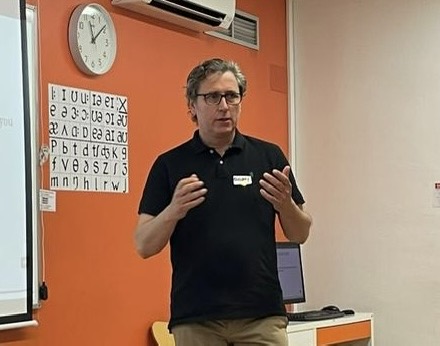More about language coaching
- Barnaby Griffiths

- Nov 9, 2020
- 3 min read
Updated: Oct 20, 2022
Hi again, with this post I’d like to present language coaching in a little more detail.

As most people will know, coaching as a discipline began in sport, where elite athletes found that they required individual coaching to help them achieve peak performance. The resounding success of this led to the development of life coaching, which aims to provide individuals with tools and strategies to overcome obstacles and limitations in their lives.
The discipline of language coaching is relatively new, and although no consensual definition therefore exists for it yet, I’m going to give you my take on it. For the past fifteen years I’ve used language coaching to help professionals improve their communication in English. I began by specialising in the field of education, working mainly with university and business school professors, though I believe language coaching can be applied in any field, and at any age.
I think the best way to present language coaching is through a comparison with language teaching, which most people will be familiar with. So I’ve highlighted some of the main differences I see between the two here:

Language coaching is holistic, in that it addresses the emotional side of individuals’ learning and provides tools and strategies for overcoming obstacles and limiting beliefs, clearly something that many language learners suffer from due to the frustrations inherent in trying to learn a new language.
In contrast with language teaching, language coaching focuses on the processes of learning language and communicating competently, seeing grammar, lexis and pronunciation as a vehicle for communication rather than a product. As a language coach, I do not present my coachee with new language, have them practise it for a while and then simply expect them to be able to use it. I am there to guide them through the entire process of assimilation and production.
Therefore, a large part of language coaching focuses on performance and how the coachee uses the language in the real context where they need it.
One of my main aims then, is to provide my coachees with communication and learning tools and strategies.
In addition to this, language coaches will help their coachees plan their learning and set realistic language learning and communication goals.
Another difference from language teaching is that language coaching will adopt more of an individual focus, requiring coachees to analyse their own abilities, strengths and weaknesses and adopt tools and strategies to enhance or address these. That’s not to say language coaching can’t be implemented in groups, it can, and any experienced language teacher will understand that very successful individual work can be done in a group setting, but I don’t have the space to go into that here, so I’ll save it for a future blog.

Language coaches will also provide their coachees with support and advice, as emotional growth forms an important part of coaching, and the same is true of learning who you are and who you can be as a communicator.
The relationship between a coach and coachee is also different to that of a teacher and student, as it is more one of collaboration and negotiation than simple knowledge transfer.
And finally there is none of the endless assessment of language teaching in language coaching, at least not in my version of it.
Well, that’s all for this blog. In my next post, I’ll look at some of the language coaching tools I use with my coachees to help them fulfil their potential as a communicator in English.
-----------------------------------------------------------------------------------------------------------------
If you would like to know more about language coaching, whether as a learner or as a language teacher, contact me for a free consultation at barnaby@bglc.es.
#EnglishLanguageCoaching #AcademicEnglish #UniversityLecturing #EnglishFluency #TeachingInternationalStudents

I've had so many students talk about having a 'mental block' when learning English. This is what really needs to be addressed.
dsa
as
goodjob